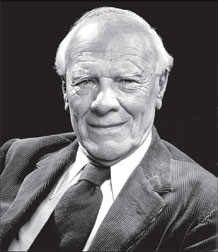The morality of language
 It is said that power corrupts and absolute power corrupts
absolutely. However, when it comes to writing, powerlessness seems to
corrupt the language. Some of the news items, features and passages in
books published today are crawling with grammatical and syntactical
errors. But those who have no power over the language keep on dishing
out what they think is best for the reader. Today it has become a social
malady and nobody seems to notice it. It is said that power corrupts and absolute power corrupts
absolutely. However, when it comes to writing, powerlessness seems to
corrupt the language. Some of the news items, features and passages in
books published today are crawling with grammatical and syntactical
errors. But those who have no power over the language keep on dishing
out what they think is best for the reader. Today it has become a social
malady and nobody seems to notice it.
No man is infallible. Authors, journalists and editors make mistakes
because they are human. But some of us at least try to maintain
standards. We discuss and debate over newspaper headlines, dubious
expressions in editorials and funny expressions in textbooks. Such an
exercise may appear to be futile to the uninitiated, but we do so to
learn from others’ mistakes.
Once Irving Howe, an eminent writer in the New York Times Book Review
wrote about “main protagonists.” However, the word “protagonist” means
the main character in a play or novel. Such mistakes occur even in
prestigious publications. But what worries intelligent readers is
rock-bottom illiteracy on the part of writers who seem to be in the
gutter and looking at the sewers!
Howlers
Some articles we read today are quite unintelligible. Some authors
and journalists keep on burdening readers with incomprehensible books
and features. Sometimes, our jaws drop when we fail to understand what
we read. When we were serious students of English many moons ago, our
teachers labelled such words and phrases as howlers. Sometimes, we were
asked to underline the howlers in a given passage. But today, half the
population seems to think that howlers are their staple diet! The other
half stands idly even without squirming.
 |
|
Malcolm Muggeridge, one of the great
writers of our times |
A sensible reader might ask, “Who is the culprit?” Surely, the
schools, colleges, universities and private tutors who undertake to
teach English in two weeks are the real culprits. Most writers do not
know the distinction between “it’s” and “its.” In a textbook printed
locally, the following howlers were found:
* The cat sat in front of the fire, cleaning it’s whiskers. (it’s
should be its)
* We always take our meals in the canteen. (In British English we
have our meals although in American English you can take your meals.)
* I beg your pardon, but I was very busy and couldn’t spare the time.
(“I beg your pardon” is used to apologise to a stranger because you’ve
bumped into them by accident. Just say, “I am sorry.”)
* Neither of my parents speaks in English. (“Speaks in English” means
we use English on particular occasions. Say, “Neither of my parents
speaks English.”)
* It is wrong to experiment with animals. (We experiment on animals,
but we experiment with a new drug.)
Great writers
Some experts say grammar can wait; let the child speak the language.
But how can the grammar of a language wait? If not for grammar, what we
speak and write will be meaningless. The purpose of learning English
grammatically is to have a link with the giants of the English tongue
who preceded us. The great writers such as Charles Dickens, Bertrand
Russell, D. H. Lawrence and Malcolm Muggeridge struggled to use the
language as clearly and beautifully as possible. It is unwise for modern
writers to deviate from the beaten track and forget the niceties of the
language.
Those who write inelegant “Black English” has a right to exist, but
they have no right to change the standard English. Most of us forget
that there is a morality of language. We have a moral right to preserve
the niceties of the language handed down to us by our forefathers.
Deterioration of the language means we too are deteriorating as a
nation.
Writers usually do not write about writing. But most writers do so
because they are fascinated by the process of writing. When you write
something, you understand it better. It is a process of self-education.
While great writing might be a gift to a chosen few, good writing is
well within our reach.
One sure-fire method of becoming an effective writer is to read
well-written books and newspapers. As you keep on reading them
regularly, you will know how to separate the grain from the chaff. |

